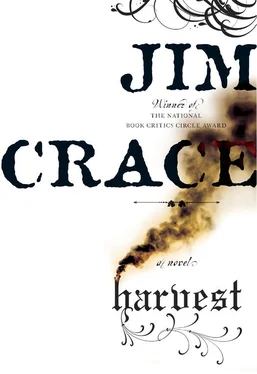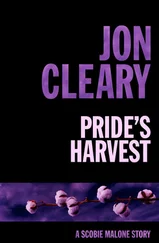I do not need to guess who’s setting fire to us. Indeed, I see the evidence all too clearly. The Beldams have found themselves a cart and the pair of oxen that we used to plow our final mark into this summer’s barley field. The husband has evidently taken me at my word. “I’ll make the pair of you rich,” I’d promised, and, so far as I can tell, looking down at their great load where they have left it in the clearing by the pillory, they have pillaged us exceedingly and have assembled quite a cargo for themselves, both from the village homes and from the manor house. I recognize my master’s tapestries, his better chairs, his wife’s old loom. I can even make out the several parts of the plow we assembled together yesterday. Was that just yesterday? I only shrug. Their father’s death has paid for this, it must be said.
For the moment I can see and hear only the husband. He is sizing up the pillory, the great unwieldy cross of wood where he has spent the most part of a week. He proves himself to be as clever with an axe as he has been with a plow. His first strike is a little high. The oak of the upright is too hard for him, but lower down, where the timbers have been dampened and the surface worn away a bit by weather and by time, his axe bite takes a mouthful at first try. He cuts out the chip with a sideways blow, and then addresses his old resting place from the other side, until even I can see the hollow where the axe has landed. I hear his every strike. I do not think it takes him more than thirty, but I am no longer watching him. I have caught sight of the Mistress herself, my eyes drawn to her by the skittering of a narrow thread of smoke, the burning faggot she is holding as she hurries in and out of the final cottages, checking there is nothing left to steal and then setting fire to anything that is dry. Her head and shoulders are wrapped in velvet, to protect her from the smoke, I guess. She has my short-bladed sword in her free hand. I have forgotten how small she is. Her smoky trail is like a moth’s, erratic, willful, spirited.
I know I have to drag myself away from this high window. I do not believe that Mistress Beldam intends to part from here leaving the manor intact. When she reaches the last house of the village and has satisfied herself that everything is beyond rescue, she is bound to scamper down the lane, together with whatever livestock has been panicked by the blaze, to where her husband is now resting from his exertions, with the pillory as dead as mutton at his feet. Then they will continue through the orchard’s apple strew to finish off the manor farm buildings left by Brooker Higgs, the Derby twins and their moonball. If there’s to be a fire started in the dry wood of the downstairs rooms, I could not be in a worse place — in the high turret of a timber house with a wooden ladder, a collapsed staircase and a wide stairway to hurry down before I even reach the flames. Indeed, I wonder if this has been her plan all along, to lure me, through some sorcery beyond my understanding, to this upper space and then to bake me here.
I do not know what makes me pause when I reach the attic rooms. I do know that going down into the lobby should be speedier and less dangerous than coming up. Descents are not as weighty as ascents. I can simply slip and slide and keep my fingers crossed. I’ll reach the safety of the courtyard very quickly. Then I’ll gather up my things and be on my way before the woman catches me. All neighborly and more-than-neighborly feelings I’ve ever had for her are gone. She frightens me. She only frightens me. That woman carries blade and fire. But pause I do. I’m anxious suddenly, alarmed, and not by the prospect of a manor fire. Something else has caught my eye so thinly that, when I stop to check, I don’t at first know where to look. Then I spot it for a second time. The oblong of dark that first I took to be a wedge of shadow under the great, long travel chest is looking now more like a seeping spill of blood.
He’s lying facedown, covered only with the chest’s loose lining. But I do not need to turn his face to verify his name. I recognize his finer clothes. He’s wearing what he wore the last time I laid eyes on him, hurtling in pursuit of Mistress Beldam at the midnight pillory. Here are his gentlemanly boots, his decorated jerkin, his townsman’s breeches and his plain, unfeathered cap. His fingers and his knuckles are still blue and green with paint. I recognize his wealthy beard and see how waxed and shaped it is, a trowel-shaped wedge of hair. I even think I can see some proof of his enduring smile from the creases on the back of his neck. I can’t believe he would be parted from his smile, even in death. The body is crunched up, of course. Full stretched, it would be longer than the chest. But this is not a body I have ever seen full stretched. This is a body that appears as I’d expect it to, lopsided, stiff and out of line. He’s died exactly as he stands, off-kilter as if he has been struck by lightning. The heavens opened and a tongue of light gave him the body of an old gnarled tree. I have no doubt that this is him, the stumbler, the Chart-Maker, the man who was too oddly brave to turn his back on us.
So far as I can tell from my brief examination of the body before I close the lid on him and tumble downstairs to run along the gallery, more fearful for myself than I have ever been before, his wounds were inflicted by a sword, the same one, I presume, that cut the ropes away at the access to the stairwell. He has been run though with great force and commitment. The blade has entered at the front a dozen times and exited behind his back, piercing his main organs and his chest. The blood has blackened and stiffened in his clothes. I do not know enough about a corpse to tell how long it has been here, or when his killing took place. It could have been last night, or equally it could have happened on the night of torture when the women named him. What’s probable, given the poor repair of the attic stairs, is that his killing took place in the upper rooms and close enough to the travel chest for the victim to be toppled in before he bled too much. Who should I hold responsible? Apart from the Beldams or the Jordan men? I have to say that for a moment I hold myself responsible. I feel that I have failed the man. I feel that I am failing him again, because I have to leave him here. By rights I ought to carry him to Turd and Turf to join the other corpses of the week, and mark his grave with a proper monument of piled stones and within sight of his beloved longpurples. He liked it there. He liked the blossoms and the light. He liked its solitude. He would have liked to listen to the juking of the birds until the end of time. But I cannot carry him, not on my own, not down those stairs, not with the fire maiden pressing down on us with her revenging flame.
The odd thing is, she does not come. Perhaps her husband has decided that she’s burned enough or he is impatient to depart before the evening and the darkness close in. He knows it’s wise to get away, to pass beyond our parish bounds before they’re stopped by someone coming back or asked for their account of where the oxen were acquired and why their cart is so loaded down with property beyond their station. Perhaps she’s tired of it herself. Her grief and anger have been spent. What is the point of taking down the manor house? What is the point of burning it with Mr. Quill inside to haunt its attics and its roofs? Maybe she has no idea that he is there, and she’s not the murderer. Whatever is the truth of it, it’s clear that I will never know. I step out of the courtyard with my bags, and there I glimpse the back of them and their great haul of plunder disappearing down the lane. The husband leads the oxen from the front, and she sits riding on the cart, her skirts pulled up to her thighs, the short sword resting on her knees and her bare legs swinging over the back. Her shoulders are draped in velvet, naturally. She’s getting even smaller now as they retreat behind the hedges and the walls, as they retreat into another world.
Читать дальше












